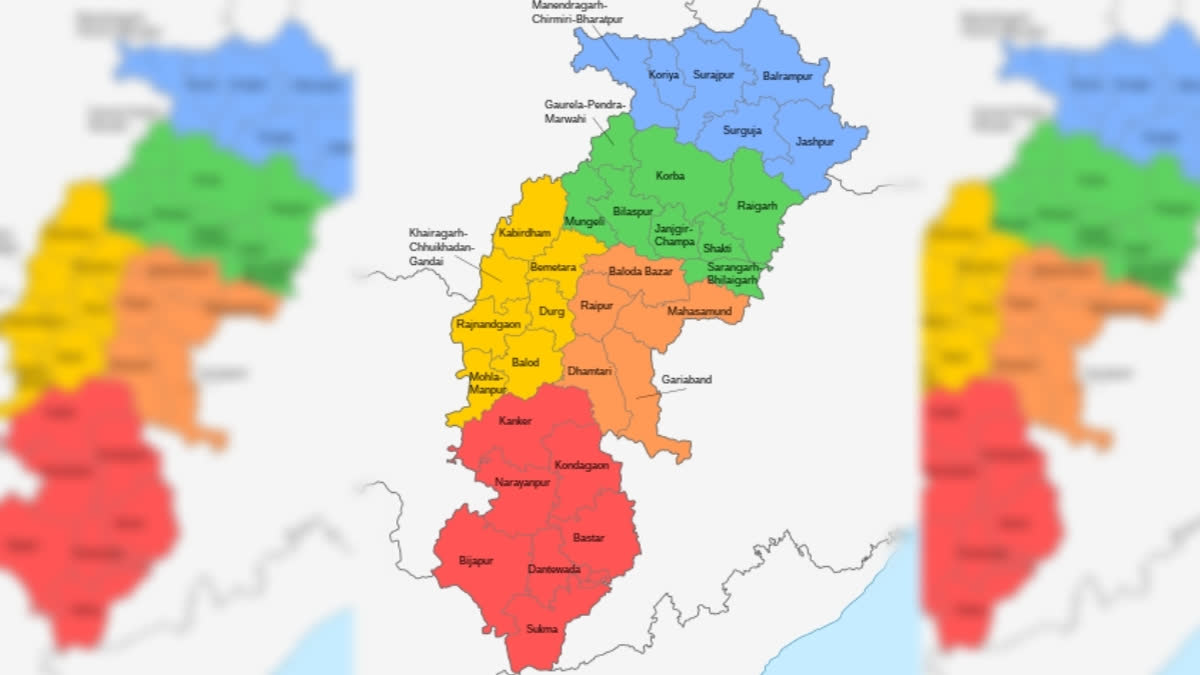Raipur (Chhattisgarh): The Election Commission of India has announced a two-phase assembly poll scheduled on November 7 and 17. As the political landscape in Chhattisgarh transforms in anticipation of the upcoming assembly elections, the state finds itself at a crossroads of promises, challenges, and an air of uncertainty.
Since the last assembly elections in 2018, the political dynamics have shifted, with both Congress and BJP vying for supremacy. With the fate of 90 assembly seats hanging in the balance, the state is gearing up for a high-stakes electoral battle that will shape the future of Chhattisgarh. In this in-depth analysis, we delve into the current composition of the house, the status of election promises, the spectre of anti-incumbency, the competition for tickets, key election issues, and the expectations of the people.
Current composition of the house:
As it stands, the Chhattisgarh Assembly comprises 90 seats, with the Congress currently holding the lion's share, boasting 71 MLAs. In contrast, the BJP has only 13 MLAs, while BSP maintains a modest two, and three MLAs hail from the Janata Congress Chhattisgarh Party. One seat remains vacant. At the helm of the state's affairs is Chief Minister Bhupesh Baghel, leading the Congress government.
Implementation of election promises:
In the lead-up to the 2018 assembly elections, the Congress government had made 36 promises to the people of Chhattisgarh. According to their claims, 34 of these promises have been fulfilled. However, the opposition, primarily the BJP, staunchly asserts that not a single promise has been fully realized. One of the prominent unfulfilled pledges is the issue of prohibition and regularization, poised to become a pivotal issue in the forthcoming elections.
Status of anti-incumbency wave:
While Congress appears to hold a strong position currently, the BJP is mounting an increasingly aggressive campaign as the election draws near. This oscillating dynamic makes it challenging to predict the outcome of the assembly elections. The margin of victory or defeat for both parties is expected to be razor-thin, potentially only differing by two to four seats.
Competition for tickets amidst a slow campaign start:
A fierce competition for electoral tickets is underway between the two major political contenders, the BJP and Congress. Intriguingly, the BJP has adopted a strategy of fielding Members of Parliament for the assembly elections, diverging from the usual practice. However, while the BJP has already released its first list of candidates, Congress has lagged behind, failing to announce a single candidate's name. This delay has hindered the momentum of the election campaign in the state.
Key election issues for the opposition:
The opposition, including the BJP, is poised to raise a multitude of issues as the election battle intensifies. These issues include prohibition, regularization, the liquor scam, inadequate infrastructure development, caste census, PSC scam, coal levy scam, Gauthan scam, DMF fund irregularities, 'Mahadev betting scam, paddy procurement, rising crime against women, and increasing crime rates, alongside concerns about women's reservation, unemployment, poverty, tribal development, irregularities in the PM Awas Yojana, and the issue of Naxalism.
Public expectations:
The people of Chhattisgarh have high hopes for their state. They expect an increase in employment opportunities, improvements in education, repairs to dilapidated roads, consistent access to electricity and water, the creation of new infrastructure to foster overall development, the completion of unfinished construction projects, and the construction of major bridges at high-traffic areas. These aspirations are pivotal in determining the electoral choices of the citizens.
Also read: Madhya Pradesh gears up for a high-stakes battle: BJP vs. Congress in the fight for power
Most pressing issues:
Several critical issues loom large over the impending elections. First and foremost, the Governor's refusal to sign the 76 per cent reservation amendment bill has ignited a political firestorm that could sway the outcome. The dismal condition of roads across the state also remains a significant concern for voters, as does the contentious matter of the liquor ban. Accusations of the state government providing protection to the land mafia and the PSC scam allegations have further fueled the opposition's rhetoric. Additionally, the opposition alleges that the Pradhan Mantri Awas Yojana has failed to deliver housing to the people. The absence of major projects and infrastructure development over the past five years has also garnered criticism. Finally, the issue of conversion holds considerable weight, especially in the Bastar region.
As Chhattisgarh braces itself for another round of democratic decision-making, the state is fraught with myriad challenges and high expectations. The outcome of the assembly elections will not only determine the political landscape but also shape the future trajectory of the state, impacting the lives of millions of Chhattisgarh residents. The forthcoming electoral battle promises to be a nail-biting contest where every seat and every vote will count, leaving both Congress and BJP in suspense, awaiting the verdict of the people.
Also read: Rajasthan Assembly Elections: A five-year saga of political shifts and challenges



